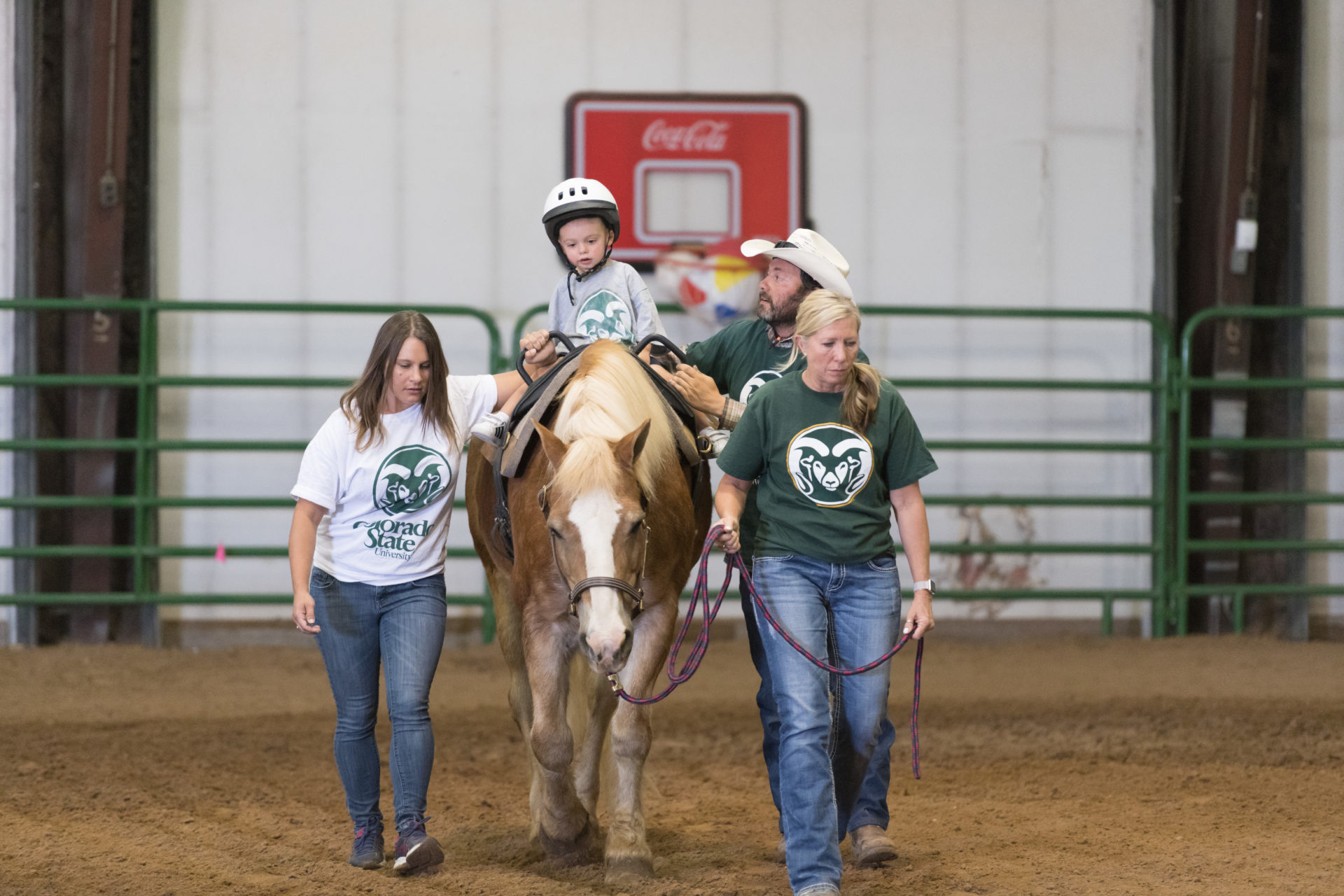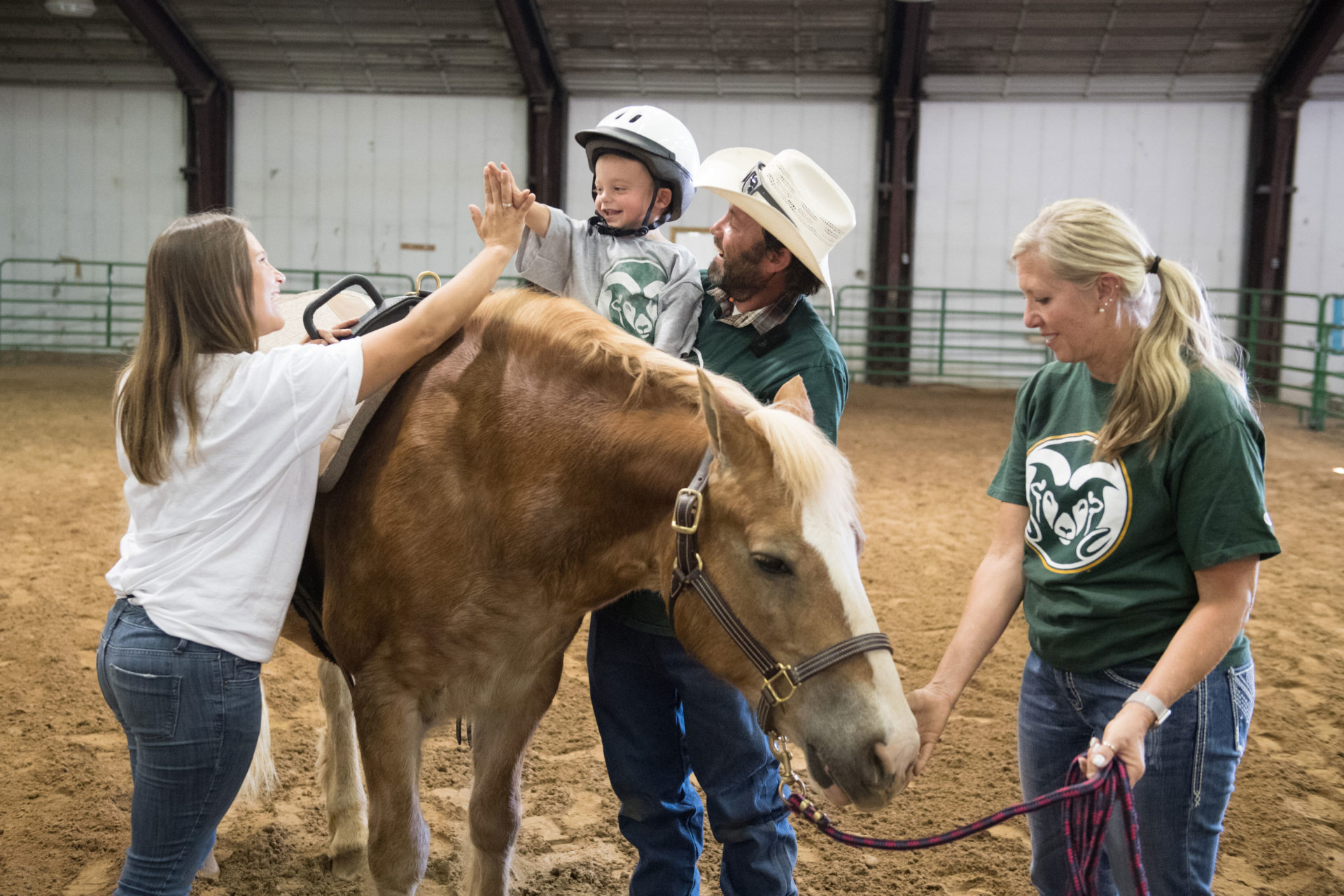Equine-assisted occupational therapy helping 2-year-old fight rare disease
It’s a little warm in the horse barn today, and like any 2-year-old would be, Maxwell Freed is squirming. He reaches for his mother, wailing.
Occupational therapist Jeff Galloway lifts Maxwell onto the broad back of a horse named Adel, who doesn’t flinch. The wailing stops, and the toddler’s hands are lost in Adel’s mane. It’s time to begin therapy.
Maxwell is no ordinary 2-year-old, although his mother, Amber Freed, wishes he were. Her son is suffering from a genetic disease so rare it bears only the name of the malfunctioning gene that causes it: SLC6A1. Maxwell’s is one of just 34 diagnosed cases around the world. There’s no cure for the rapidly progressing illness, which attacks the neurological system, causing seizures and slowing motor development. By the time Maxwell is 4, he will be ravaged by more seizures.
The Freed family is fighting to help their son bank every ounce of motor-developmental progress before his disease catches up. That’s why, every week, Maxwell is on a horse at the Temple Grandin Equine Center in north Denver, receiving occupational therapy from licensed and trained professionals, including Galloway. The therapist sits Maxwell on gently trotting horses to help strengthen his core, feed him motor cues, and provide mental benefits from interacting with these majestically strong but gentle animals.
“It’s hard to work a 2-year-old’s core – there’s only so much you can do. They’re not going to be doing Pilates,” says Amber Freed. “[The equine-assisted therapy] is fun, it’s calming, and it’s a good workout for him. And feeling the power of the horse has done so much for him. I think after he does therapy, the cadence in his step is much better.”
Colorado State initiative
Providing a place for clients like Maxwell to access equine-assisted therapy is the mission of the Temple Grandin Equine Center, an initiative of Colorado State University’s College of Agricultural Sciences. The center is named for the inimitable Temple Grandin, professor in the CSU Department of Animal Sciences, autism advocate, and world-renowned pioneer of humane livestock handling practices.
Grandin has often declared that, as a young person with autism, her relationship with horses was her salvation. The equine center, which has offered services from its Fort Collins location since 2014, is in the midst of a physical and geographical transformation as a key part of CSU’s role in the National Western Center redevelopment. The equine center now offers services in both Fort Collins and the temporary location in north Denver, near the site of the National Western Complex.
That’s where Maxwell Freed spends every Monday afternoon.
“The days after he does it, he’s so much happier, he’s eating, and his natural walking gait has more rhythmic movement, like he’s mimicking the horse,” Amber Freed says. “It has been a life-changing experience for Maxwell. It has made such a difference in my little boy’s life.”

Occupational therapist Jeff Galloway, and assistants Kristy Guzman (left) and Stacy Mowbray, perform an equine-assisted occupational therapy session with Maxwell Freed at the Temple Grandin Equine Center, Aug. 19, 2019.
Licensed practitioners
Equine-assisted occupational therapy isn’t just about petting horses, although there’s plenty of that, too, says Adam Daurio, director of administration and outreach for the Temple Grandin Equine Center. Independent therapists, like Galloway, contract with the center to offer the therapeutic value of horses for their clients suffering physical and mental challenges.
“Licensed practitioners, within their standard of care, utilize our horses or a horse environment as a tool,” Daurio explains. “It’s a strategy of providing many types of therapy.”
In an effort to quantify the benefits of such therapies, the equine center is also working with CSU postdoctoral fellow Caiti Peters on an efficacy study designed to document and standardize therapy practices, particularly for autistic patients.
Research is ongoing, but the benefits are undeniable, especially for patients like young Maxwell Freed. Equine-assisted therapy won’t cure him, but it’s a reprieve from a cruel disease.
“The joy I see in Maxwell’s face could not bring me any more joy,” says Amber Freed. “It makes my heart smile.”

How to help
Occupational therapy won’t cure Maxwell Freed, but gene replacement therapy could. His family is raising money for research and a clinical trial for SLC6A1. Find out more.